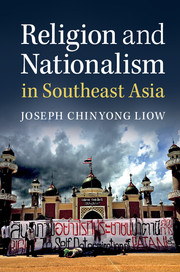Book contents
- Frontmatter
- Dedication
- Contents
- Preface
- Acknowledgments
- Glossary
- Introduction
- 1 Faith and Flag
- 2 Southern Philippines: Reframing Moro Nationalism from (Bangsa) Moro to Bangsamoro
- 3 Thailand's Southern Border Provinces: Constructing Narratives and Imagining Patani Darussalam
- 4 Malaysia: Religion, Ethno-Nationalism, and Turf-Guarding
- 5 Indonesia: Contesting Principles of Nationhood
- Conclusion
- Bibliography
- Index
Introduction
Published online by Cambridge University Press: 05 August 2016
- Frontmatter
- Dedication
- Contents
- Preface
- Acknowledgments
- Glossary
- Introduction
- 1 Faith and Flag
- 2 Southern Philippines: Reframing Moro Nationalism from (Bangsa) Moro to Bangsamoro
- 3 Thailand's Southern Border Provinces: Constructing Narratives and Imagining Patani Darussalam
- 4 Malaysia: Religion, Ethno-Nationalism, and Turf-Guarding
- 5 Indonesia: Contesting Principles of Nationhood
- Conclusion
- Bibliography
- Index
Summary
Southeast Asia is doubtless one of the most dynamic economic regions in the world. It is, at the same time, also home to some of the most enduring post-colonial intrastate conflicts. A brief look at the headlines of major broadsheets over the last decade and a half is a good indicator of how this has cast a shadow over the region. In Myanmar (Burma), violence has broken out between Buddhists and Muslims even as the country creeps down the path of democratization. In Thailand and the Philippines, Muslim minority groups in their respective southern provinces are purportedly waging jihad or “holy war” against what we are told are majoritarian prejudices of predominantly Buddhist and Catholic states and societies, respectively. While Malaysia has thus far avoided the outbreak of violence, the country nevertheless has witnessed an alarming escalation of tension as a Muslim-dominated government has allowed the expression of acutely exclusivist majoritarian views on religion in the name of “defending” the Islamic faith to go unchecked, the deleterious effect of which has been the constriction of the religio-cultural space afforded to non-Muslims by the Constitution. In Indonesia, post-Suharto political transformation appeared in its early years to have given rise to sectarianism and religious intolerance, which in many cases have also boiled over to violence not only between Muslims and non-Muslims, but within Indonesia's kaleidoscopic Muslim community as well.
On close inspection, a common thematic thread appears to weave through many of these conflicts – the role of religion. Because of how religious language and symbolism are evoked in some form or other, many of the aforementioned conflicts have been the subject of a great deal of media and academic attention that have chosen intuitively to cast them as religious conflicts. Given the popularity and appeal of such views, particularly those emanating from media circles, both local and international, a proper understanding of the role of religion in these conflicts is necessary and urgent. It is for this purpose that this book is written.
The book poses the following questions: how and why did religion come to assume such a prominent role in intrastate conflicts in Southeast Asia, and how should we endeavor to understand this role?
- Type
- Chapter
- Information
- Religion and Nationalism in Southeast Asia , pp. 1 - 17Publisher: Cambridge University PressPrint publication year: 2016

